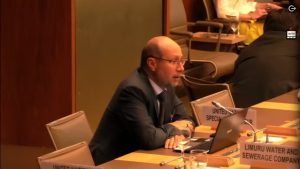South Africa must redouble its efforts to tackle the crude legacy of pre-1994 environmental racism, including the abhorrent practice of intentionally situating landfills and polluting industries along racial lines and in low-income and migrant communities, a UN expert said on Friday, August 11, 2023.

“To this day, the legacy of pervasive air, water and chemical pollution disproportionately impacts marginalised and poor communities,” said Marcos Orellana, the UN Special Rapporteur on toxics and human rights in a statement issued at the end of an official visit to South Africa.
“The challenges to overcoming the legacy of environmental racism are enormous, and they are compounded by structural inequality, widespread poverty, unemployment, and new environmental threats such as hazardous synthetic chemicals and the climate emergency,” Orellana said.
The Special Rapporteur noted that the South African Constitution is renowned worldwide for its advanced positions on human rights. For example, the Constitution recognises the justiciable right of everyone to an environment that is not harmful to their health or well-being. He pointed out that it took the UN General Assembly another 25 years to globally recognise the critical importance of the right to a clean, healthy and sustainable environment.
Since 1994, South Africa has also adopted important norms governing chemicals and wastes. There are also important measures in progress, such as a project to eliminate polychlorinated biphenyls, a programme to remove asbestos from roofing, and a climate bill.
“But at the same time, there are laws predating 1994 that continue to result in harms and human rights infringements, such as the laws governing hazardous waste from 1973 and pesticides from 1947,” Orellana said.
“South Africa’s strong legislative framework should serve as the backbone for accountability and access to effective remedies,” he said. “Yet where powerful actors are allowed to act with impunity and disregard environmental protections, the confidence in democracy and the environmental rule of law begin to erode.”
According to the expert, for many decades, the mining industry has contributed to South Africa’s economic development. Its legacy also includes thousands of derelict mines and mine waste dumps in the country. Orellana said that often, the hope for pollution prevention and remediation upon mine closures is lost in the poor enforcement of legislation.
“The result is a landscape scarred by abandoned mines, tailing dumps and acid mine drainage,” he said.
Dust from coal mines, along with ashes, mercury emissions, and PM2.5 from coal burning have a severe negative impact on air quality, as the country generates almost 90% of its electricity from coal. South Africa has begun to transition away from fossil fuels for energy production, but the process faces serious obstacles, not least the licensing of new coal mines and offshore oil and gas, the expert said.
“In the Western Cape province, I heard from women farm workers who were routinely exposed to hazardous pesticides and who denounced serious adverse health impacts in their communities,” Orellana said. The expert said that during his visit he had also learned that pesticides meant for agricultural use are illegally sold and used to combat rampant rat and cockroach pest infestations that spread in the absence of sanitation and waste management services in informal settlements.
“I was appalled to learn of the many children who were poisoned or died from eating, drinking or handling hazardous pesticides,” Orellana said. “South Africa should ban the import of all highly hazardous pesticides, including those that have been banned for use in their country of origin, without delay,” he said.
At the conclusion of his visit, the Special Rapporteur thanked the people of South Africa for their hospitality and the Government for its invitation to visit the country. The UN expert will present a report on his visit, including his findings and recommendations to the Human Rights Council in September 2024.
